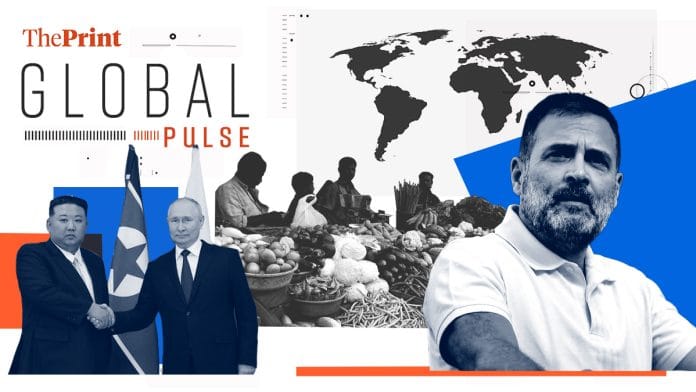New Delhi: The “idea” and “image” of Narendra Modi “has been destroyed”, Rahul Gandhi tells the Financial Times correspondent John Reed in an interview, pointing out how the Bharatiya Janata Party (BJP) has been “wiped out” in Ayodhya despite “spending the last 10 years talking about Ayodhya”.
The “space in the Indian political system has been blown open” by the election results, and “the smallest disturbance” can drop the coalition government the BJP has formed, FT quotes Rahul as saying. Rahul — who stepped down as the Congress President after the BJP’s 2019 decisive victory — is back at the center of the country’s politics after the unexpected election results, writes Reed. Citing analysts, Reed writes that despite ‘shehzada‘ taunts by Modi and the “Modi-backer” media outlets, the poll campaign saw Rahul rebuilding his political brand with two ‘yatras’. Rahul tells FT the opposition parties fought with their “hands tied”, with Reed mentioning the jailing of two state leaders and freezing of some Congress bank accounts ahead of the polls. But the voters’ verdict, Rahul adds, shows that “the basic architecture of BJP — the idea of creating religious hatred — that has collapsed”.
In a Bloomberg opinion piece, Why Indians aren’t happy with 8% economic growth, columnist Andy Mukherjee writes, “It’s impossible to make sense of India’s employment situation — or consumer demand — by only looking at the fifth of the labour force that holds regular jobs while the rest are either self-employed or work when they can find it.”
With the annual scorecard on unincorporated enterprises released last week, he writes that the Modi-led government has a pattern of hiding bad news till after election victories. The scorecard shows that despite an 8% growth in workers, the number of people earning as little as $1,100 a year has increased by six million in rural areas and a third more than that in urban centres since COVID-19, indicating that the GDP growth is not reflected in people’s income. While this is behind the “weak consumer demand”, which has been worrying businesses, the stock market, Mukherjee writes, remains “buoyed by visions of massive infrastructure creation and private capital expenditure”. The voters, he asserts, have sent the BJP a message in this election.
In a Guardian analysis, Consensus or division? How Modi will manage Indian coalition government, correspondent Hannah Ellis-Petersen discusses how Modi will govern in a coalition, something he hasn’t done so far. While the Prime Minister’s messaging since the election setback is that his office is the people’s, his party didn’t give key seats to coalition partners while ensuring there’s no Muslim minister in the country, writes Ellis-Petersen.
As unemployment was one of the major reasons behind the BJP’s election losses, the PM may “initially prioritise economic reforms that have eluded him so far”, she writes, pointing out that less than 3% of global manufacturing takes place in India despite foreign interest in India’s economy. Modi may also try to push agricultural reforms amid coalition restraints, she writes noting the release of millions to farmers after he took charge for his third term. “Secular” partners, however, are expected to restrict the “Hindu-first agenda” as policies such as the Uniform Civil Code, One Nation One Election and a “much-feared” national register of citizens take a backseat, she writes. However, some people fear that Modi will “double down on divisive, oppressive methods”, she adds.
Al Jazeera correspondent Abid Hussain’s report — ‘Will India’s Modi break the ice with Pakistan in his third term?’ — highlights the absence of a Pakistani delegation at Modi’s swearing-in.
Hussain writes that the “fresh hope” that arose for India-Pakistan ties when Pakistan’s then-Prime Minister Nawaz Sharif attended Modi’s 2014 swearing-in is all but “extinguished” now. He calls 2019 a turning point, where Modi’s “election campaign was marked by anti-Pakistan jingoism fuelled by a sharp escalation in tensions” after 40 soldiers were killed in Kashmir, with India blaming Pakistan for it. Analysts expect Modi to continue to pursue his tough posture towards Pakistan, writes Hussain, noting that India has also blamed Pakistan for the 9 June killing of nine Hindu pilgrims in Reasi.
Putin to visit North Korea & floods-landslides in Central America
Russian President Vladimir Putin is all set to visit North Korea this week, raising fears of an ammunition partnership between the two countries while the Ukraine war drags on. Read The New York Times report to know more.
Dozens have been killed in El Salvador and Guatemala due to heavy rains prompting floods and landslides. Read the DW report to know more.
(Edited by Madhurita Goswami)






